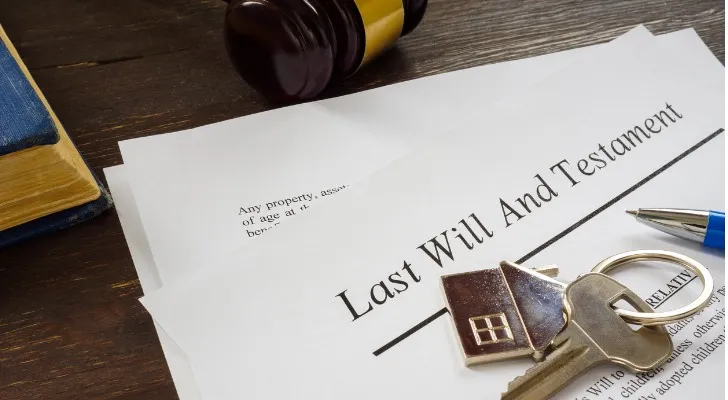When someone dies, he or she may have a will or a document outlining their wishes for the disposition of their assets. You may need to track down this will for a number of reasons, from finding out what happened to their assets to understanding more about someone for genealogical research. It doesn’t have to be difficult, and you can typically do so for free through public probate records.
Consider working with a financial advisor as you engage in estate planning for you and your spouse so that your entire financial picture is considered.
Understanding How Wills and Probate Work
A will is a legal document that outlines an individual’s wishes regarding the distribution of their property and assets after their death. It is an essential component of estate planning and ensures that the deceased person’s belongings are distributed according to their wishes.
Before you try to obtain a will it’s important to understand how the probate process works. The probate process initiates after an individual’s death, where the court verifies the validity of the will, identifies the assets and distributes them to the appropriate beneficiaries. While individuals can self educate on wills and probate, a financial advisor can also provide important insight into estate planning and the probate process.
In the probate process, multiple parties play important roles, such as executors, trustees and beneficiaries. Here is the role each plays:
- Executors are responsible for managing the deceased person’s assets and debts and distributing them according to the will’s terms.
- Trustees manage assets held in a trust for the beneficiaries.
- Beneficiaries receive assets or property as specified in the will or trust.
Individuals entitled to see a will typically include executors, beneficiaries, creditors, estate administrators and those with a justifiable interest in the will. A certified copy of a will can be obtained during or after the probate process. However, obtaining a will copy may involve certain costs, such as court fees and charges for online services.
How to Find a Will Before and After Probate
Several methods can help locate a will before and after the probate process. Searching will registries is a popular approach, as many people choose to register their wills with public or private registration companies like The National Will Register or a paid service like US Legal Wills.
Online will search strategies, such as these registries, can provide access to extensive databases with potentially quicker results but may have a fee for access. Another useful method is contacting the deceased person’s attorney, as they may have drafted the will and can provide information about its location.
The best way to find a will might be through public probate records, which can provide valuable information about wills and probate matters. Some public records may require a subscription or payment to view, while others may be free to access. Additionally, you can check with the probate court responsible for handling the deceased person’s estate for information about the will.
Offline will search strategies, such as investigating the deceased person’s banks or safe deposit boxes and asking family members or friends for information, may require more time and effort as they might involve in-person visits to institutions or engaging with other individuals. Furthermore, inquiring at nursing homes where the deceased person may have resided could lead to discovering the will’s location.
How to Obtain a Will Online

Once you have located a will, you may face some potential challenges in obtaining a copy, such as lack of legal standing, online access barriers or fees associated with obtaining a copy of the will. Nonetheless, you can acquire a copy from the probate court, either in person or via written request, if you think you are entitled to receive one.
Alternatively, you can procure a copy of a will online through paid websites like CountyRecordsResearch.com that offer searchable databases for obtaining will copies online. If the will is in your local probate court’s public records, you can request a copy directly from there. Fees may apply when obtaining a will copy online or in-person from a probate court.
What to Do If You Cannot Find a Will
If you cannot find a will due to reasons like intestate succession, which occurs when someone dies without a will, then there might not be one to see. Take note that state laws determine the distribution of assets, usually to the closest living relatives. You can follow this checklist to guide you in finding a will, if it exists:
- Check for a registered will with a public or private will registry
- Contact the deceased person’s attorney, if known
- Search public records using online resources (e.g., Ancestry.com) or local government archives
- Consult the probate court handling the deceased person’s estate
- Investigate the deceased person’s banks or safety deposit boxes
- Ask family members or friends for information
- Inquire at places the deceased person may have resided, such as nursing homes
If the will doesn’t turn up from any of these searches then you can either feel assured that one does not exist or you can consult with an attorney to see if there are any other options available to you.
Tips for Dealing With a Loved One’s Will
Handling a loved one’s will can be an emotional and complex process, especially in the weeks following their passing. It often involves not only legal and financial responsibilities but also sensitive family dynamics. Taking a thoughtful, organized approach can help you navigate the process more smoothly and ensure your loved one’s wishes are honored properly.
- Locate the original will: Start by finding the most recent, signed version of the will. It’s often kept in a safe deposit box, with an attorney, or stored digitally with an estate planning service. Having the original document is crucial for validating the will in probate court and beginning the formal administration process.
- Understand the Executor’s role: The executor (also called a personal representative) is responsible for managing the estate, paying debts, filing taxes and distributing assets according to the will. If you’re named executor, make sure you fully understand your duties and the timelines involved. Consulting an estate attorney can help you avoid legal missteps and ensure the process stays on track.
- File the will with the probate court: Most states require the will to be filed with the local probate court soon after death, even if formal probate isn’t necessary. Filing initiates the legal process that confirms the will’s validity and grants the executor authority to act on behalf of the estate. Check your state’s deadline (typically within 30 to 90 days) to stay compliant.
- Communicate clearly with family members: Transparency is key to preventing misunderstandings. Keep beneficiaries and family members informed about the estate’s progress, timelines, and decisions. Open communication can help minimize conflict and build trust during what is often a difficult time.
- Organize and protect financial records: Gather bank statements, tax returns, property deeds and any investment or insurance documents early in the process. Keeping these records secure and well-organized makes it easier to value assets and distribute them accurately. It also protects against potential disputes or missed accounts.
Dealing with a loved one’s will requires patience, compassion and attention to detail. By staying organized and seeking professional guidance when needed, you can ensure that the estate is handled efficiently and respectfully. An estate attorney or financial advisor can provide valuable support, helping you navigate probate requirements and make decisions that honor your loved one’s legacy.
Bottom Line

Finding and obtaining a will online may require an understanding of wills, the probate process and the various methods available to locate and access a will. Individuals can efficiently navigate the process of locating and obtaining a will online, ensuring that the deceased person’s estate is managed according to his or her wishes. Addressing potential challenges in the process can be made easier with the guidance of an estate planning attorney or a financial advisor.
Tips on Estate Planning
- A financial advisor can help you build an estate plan for after you’re gone. Finding a financial advisor doesn’t have to be hard. SmartAsset’s free tool matches you with vetted financial advisors who serve your area, and you can have a free introductory call with your advisor matches to decide which one you feel is right for you. If you’re ready to find an advisor who can help you achieve your financial goals, get started now.
- To get an overview of what’s entailed in estate planning, read SmartAsset’s introduction to estate planning and the many factors to take into account.
Photo credit: ©iStock.com/designer491, ©iStock.com/Ridofranz, ©iStock.com/andresr
